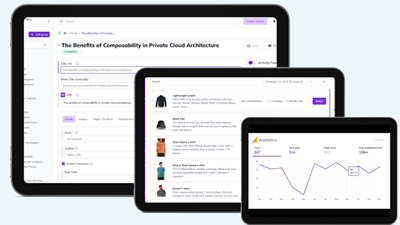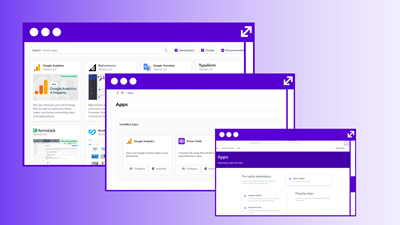The Benefits of Composability in Private Cloud Architecture


As businesses continue to rely on cloud-based services, private cloud architecture has become famous for organizations looking to improve their IT services. One of the key advantages of private cloud architecture is the ability to create a highly composable environment where individual components can be quickly and efficiently combined to deliver quality IT services that meet the business's unique needs. In this article, we will explore the benefits of composability in private cloud architecture and how companies can implement this approach to improve their IT services.
What is Private Cloud Architecture?
Private cloud architecture is a computing model that provides businesses with a dedicated, secure environment for their IT services. In private cloud architecture, the infrastructure is designed and operated solely for a single organization, providing greater control over resources and better customization options.
What is Composability?

Composability refers to the ability to assemble a system or application from individual building blocks, each with its specific function and purpose. In private cloud architecture, different components, such as storage, computing, and networking resources, can be combined and provisioned on demand to meet the specific needs of a particular workload or application. Composability is an essential aspect of private cloud architecture. It enables businesses to create a highly modular and granular infrastructure that can be easily adapted to meet their unique IT service needs. By utilizing composability, companies can optimize their IT services to deliver the quality IT services people need to succeed in today's competitive market.
What is Composability's role in Private Cloud Architecture?
Composability is the ability to assemble a system or application from individual building blocks, or components, each with its own specific function and purpose. In private cloud architecture, composability enables businesses to create a highly modular and granular infrastructure that can be easily adapted to meet their specific needs. By combining and provisioning different components, such as on-demand storage, computing, and networking resources, businesses can optimize their resource utilization, reduce costs, and improve flexibility, scalability, and security. Composability is an essential aspect of private cloud architecture that helps businesses stay competitive in today's rapidly evolving digital landscape.
Benefits of Composability in Private Cloud Architecture
The composability approach enables organizations to more efficiently manage their IT infrastructure by quickly reconfiguring resources to meet changing demands. Here are some of the benefits of composability in private cloud architecture:
1) Effective Resource Utilization
One of the primary benefits of composability in private cloud architecture is effective resource utilization. By breaking down complex systems into smaller, more manageable components, businesses can more efficiently allocate resources to where they are most needed, ensuring that their IT services are continuously optimized for performance and efficiency. This approach allows businesses to reduce waste by providing only the necessary resources, leading to cost savings and a more environmentally friendly method.
2) Greater Flexibility and Agility
Composability also allows for greater flexibility and agility in IT operations. As workloads and applications change, businesses can quickly and easily adapt their infrastructure to meet customer demands without having to undertake costly and time-consuming infrastructure changes. This means that corporations can respond more rapidly to changes in the market or to new business opportunities, giving them a competitive advantage in today's fast-paced business environment. For instance, during peak periods, such as the holiday season or product launches, businesses can scale up their infrastructure to accommodate the increased demand and scale down during quieter periods. This approach enables companies to stay agile and responsive to changing market conditions. The famous American technology company Intel has also implemented composability in its private cloud architecture to improve resource utilization and reduce costs. The company uses a modular architecture that allows different components, such as processors, storage, and networking, to be easily combined and reconfigured as needed. This approach has helped Intel to improve its agility and reduce its time-to-market for new products.
3) Increased Scalability
Another essential benefit of composability in private cloud architecture is increased scalability. By provisioning resources on-demand, businesses can easily scale their infrastructure up or down as needed without investing in additional hardware or infrastructure. This means that companies can more easily accommodate spikes in demand without worrying about capacity constraints or service interruptions.
4) Data Security and Compliance
Composability plays a vital role in data security and compliance. By creating a highly modular and granular infrastructure, businesses can more effectively isolate and secure their data, ensuring that sensitive information is always protected. This is particularly important for firms operating in highly regulated industries, where compliance with strict data security and privacy regulations is essential. For instance, by creating a granular infrastructure, companies can isolate sensitive data and limit access to only authorized users, reducing the risk of data breaches. Composability also ensures that businesses can quickly respond to security incidents by identifying and isolating the affected.
5) Reduced Costs
Composability in private cloud architecture allows businesses to optimize their resource utilization, resulting in significant cost savings. Corporations can avoid overprovisioning and reduce waste by providing only the resources required for a specific workload. This means that businesses can reduce their IT infrastructure costs without sacrificing performance or availability, providing a valuable advantage in today's cost-conscious business environment.
6) Improved Reliability
Composability in private cloud architecture also enhances the reliability of IT services. Composable infrastructure is highly resilient and fault-tolerant, meaning that businesses can ensure the availability of their IT services even in the event of hardware failures or other issues. This is because the modular nature of composable infrastructure allows for the easy replacement of faulty components without disrupting the entire system. Additionally, the use of redundant components and failover mechanisms further improves reliability and ensures that IT services are always available to users. The improved reliability provided by composability helps businesses maintain the continuity of their operations and avoid costly downtime.
7) Enhanced Collaboration
Composability in private cloud architecture also facilitates collaboration between different teams and departments within a business. Different groups can work independently on various parts of the system by breaking down IT services into individual components. This enables teams to focus on their specific areas of expertise, resulting in faster development cycles and better outcomes.
8) Implementing Composability in Private Cloud Architecture
Implementing composability in private cloud architecture requires a systematic and strategic approach. Here are some key steps that businesses can take to ensure the success of their composability initiatives:
Designing components with composability in mind.
To ensure that different components can be combined and provisioned on demand, businesses should design each element with composability in mind. This means breaking down bigger components into smaller, more granular ones that can be recombined and repurposed as needed.
Managing and automating infrastructure.
To fully realize the benefits of composability, businesses should also consider automating their infrastructure. This can include automating the deployment of resources, monitoring and reporting on performance metrics, and implementing policies and procedures for managing and securing resources.
The Future of Composability in Private Cloud Architecture

The future of composability in private cloud architecture is bright, with emerging trends and innovations that promise to further enhance its capabilities and benefits. Here are some predictions for the future of composability.
- Increased use of artificial intelligence (AI) and machine learning (ML) in composability: AI and ML can help businesses optimize their resource utilization and automate many processes in managing and provisioning resources in a composable infrastructure. For example, AI can analyze usage patterns and predict future resource needs, while ML can identify and remediate performance issues before they become problems.
- Integration with edge computing: As more businesses adopt edge computing to process data closer to where it's generated, the need for a composable infrastructure that can be easily provisioned and managed at the edge will increase. Composability can enable businesses to quickly deploy and scale edge resources as needed while ensuring security and compliance.
- Continued development of software-defined infrastructure: Software-defined infrastructure (SDI) is a crucial enabler of composability. The development of SDI is expected to continue with new features and capabilities that can support more complex and dynamic composable architectures.
- Expansion of composable services: As the benefits of composability become more widely recognized, there will likely be an increase in the number and variety of composable services available to businesses. This can include specialized services for specific industries or use cases and more general-purpose composable services that can be customized to meet a wide range of needs.
Composability is an essential aspect of private cloud architecture that can offer businesses significant benefits such as effective resource utilization, greater flexibility and agility, increased scalability, and data security and compliance. As technology continues to evolve, we can expect to see emerging trends and innovations in the field of composability that will further enhance its capabilities. To fully leverage the benefits of composability, businesses must design their components with composability in mind, invest in necessary tools and processes, and manage and automate their infrastructure. It is also essential to keep up with the latest trends and innovations in the field and continuously evaluate and optimize their composability strategies.

About the Author
Agility CMS is Canada's original headless CMS platform. Since 2002, Agility has helped companies across Canada and around the world better manage their content. Marketers are free to create the content they want, when they want it. Developers are empowered to build what they want, how they want.
- Get a demo for a personalized walkthrough.
- Try for FREE and experience Agility CMS.
- Contact us with your questions.



